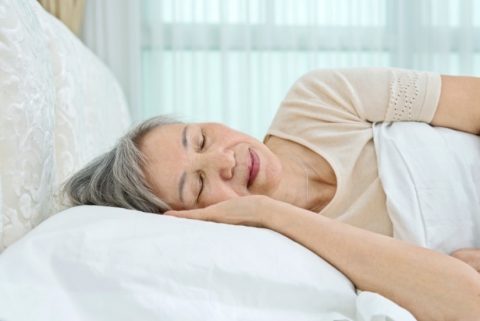Sleep Apnea and Senior Health
If you snore, you might think the biggest problem it creates is disturbing your partner’s sleep. Actually, it could be a sign of a much more serious issue. Sleep apnea in elderly adults is prevalent, and it can lead to a host of issues more dangerous than annoying your spouse.

Why? Because along with exercise and a good diet, sleep is one of the most important factors in a healthy lifestyle. When a problem like uncontrolled sleep apnea disrupts your rest, it can cause problems, particularly for your cardiovascular and metabolic health. What’s worse is that you may have sleep apnea and not even know it.
- What is sleep apnea? It’s a problem that happens when the upper airway muscles relax during sleep, closing the airway and preventing the sleeper from getting enough air. During an episode of apnea, breathing can pause for 10 seconds or more. After that, the person’s reflexes will kick in and cause breathing to begin again.
- Why is apnea a big problem? Insomnia in elderly adults is sometimes seen as a normal part of the aging process, but it is often because of apnea. Lack of sleep resulting from apnea can cause people to suffer from fatigue and mood swings, as well as losing focus and productivity. Some report waking up with a dry mouth or with a headache, which could be caused by low oxygen or high carbon dioxide levels while sleeping. Worse, a wide body of research links sleep apnea with health conditions like diabetes, strokes, and heart attacks, and having sleep apnea can even shorten a person’s lifespan. That’s why it’s important to seek treatment for apnea.
- Cognitive decline can result from sleep apnea. Elderly dementia concerns are intensified by sleep apnea, because there have been studies indicating that older people, particularly women, with sleep apnea are at risk of developing cognitive problems and dementia.
- There are two types of sleep apnea.
- Obstructive sleep apnea: This kind of apnea occurs when air can’t flow in and out of the nose and mouth.
- Central sleep apnea: In this type of apnea, which is uncommon, the brain doesn’t send the right signals to the brain to make the sleeper breathe.
- Being overweight increases a person’s risk of obstructive sleep apnea. However, it’s not the only reason people develop the condition. Genetics play a role, and obstructive sleep apnea in elderly people often has to do with medications they’re taking, because ingestion of alcohol and certain medications can impact upper airway muscle tone.
Apnea can be treated, and when an elderly person lives someplace where their wellbeing is prioritized, it’s easy to seek care for health and wellness. At each Cambridge Village location, we offer an exceptional lifestyle, with evolving wellness, concierge healthcare, and engaged experience, for a retirement experience that exceeds your expectations. To experience all the reasons that we’re considered North Carolina’s premier Optimal Living® community for active adults, call us today at (910) 239-9500 or contact us through our website.